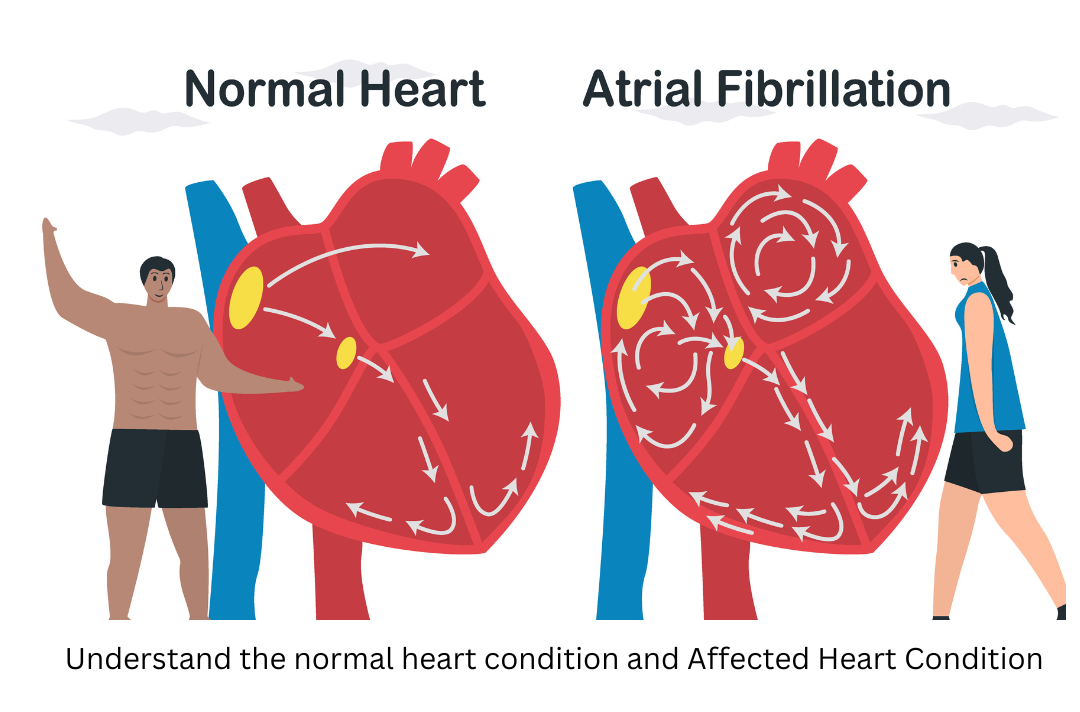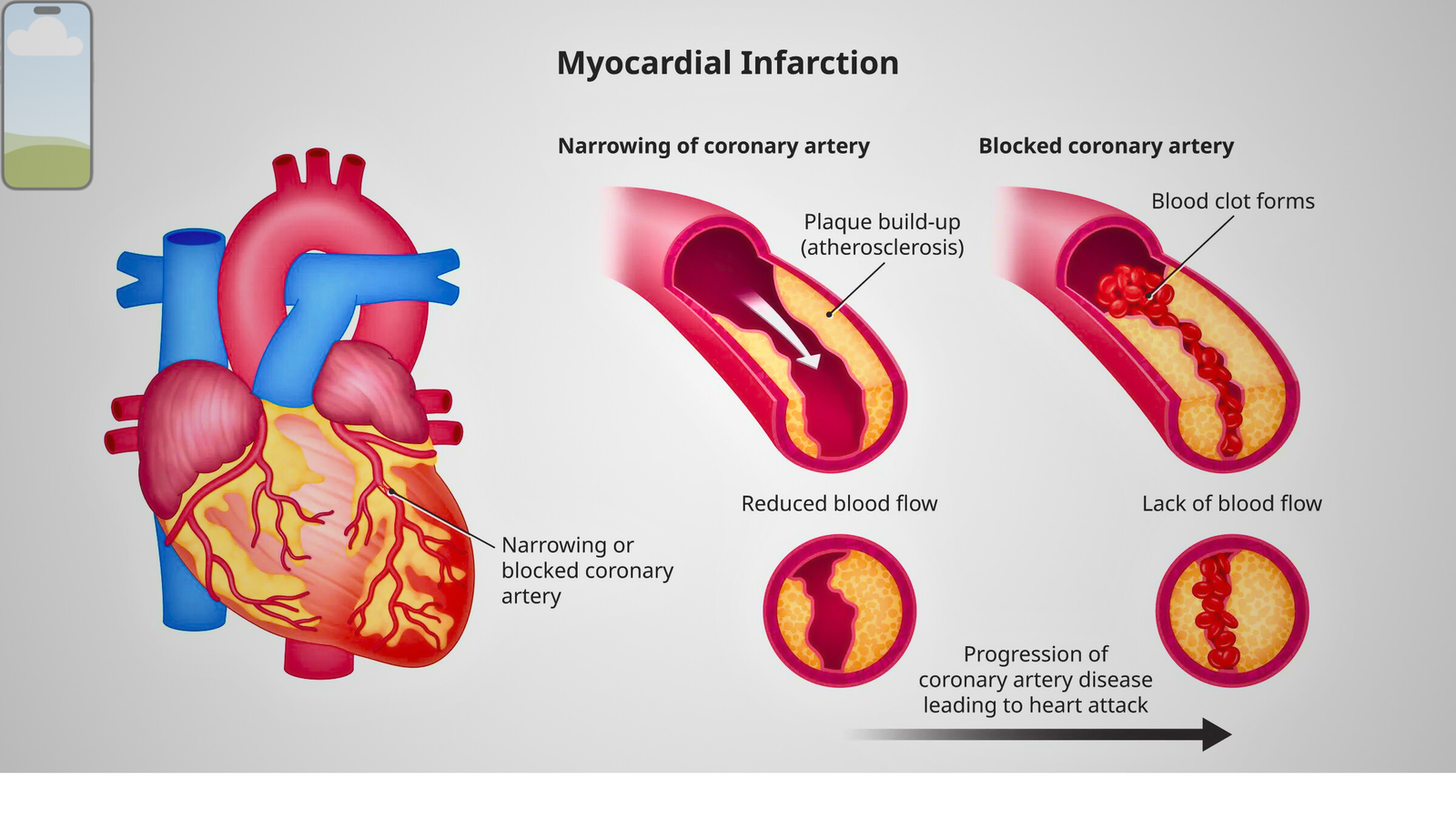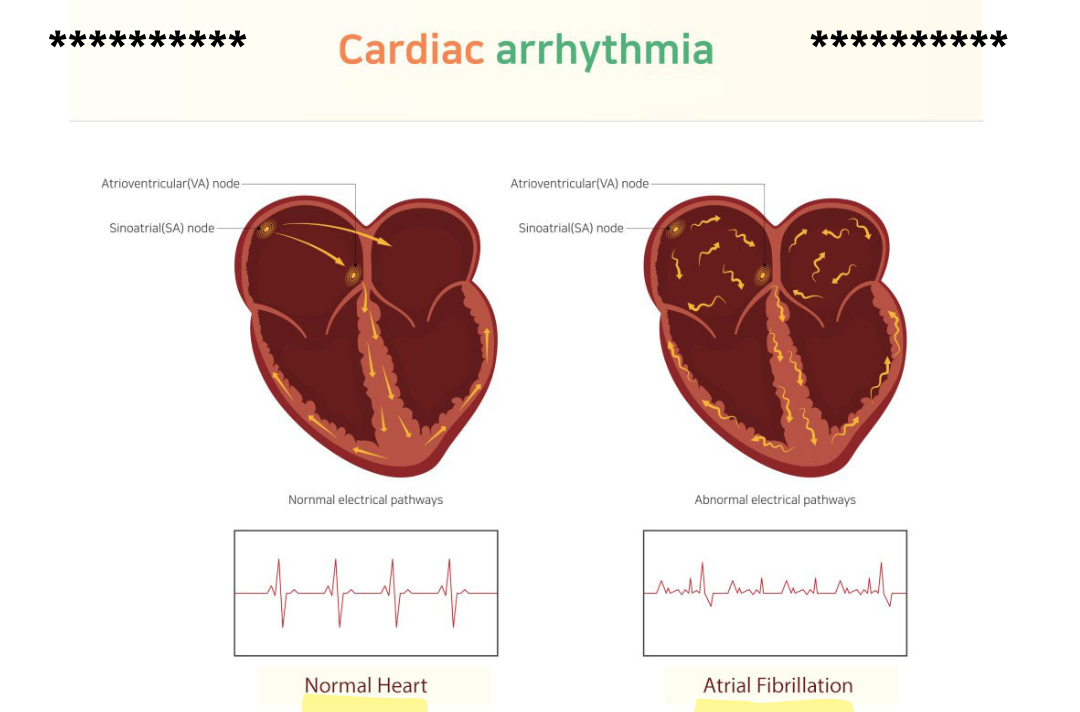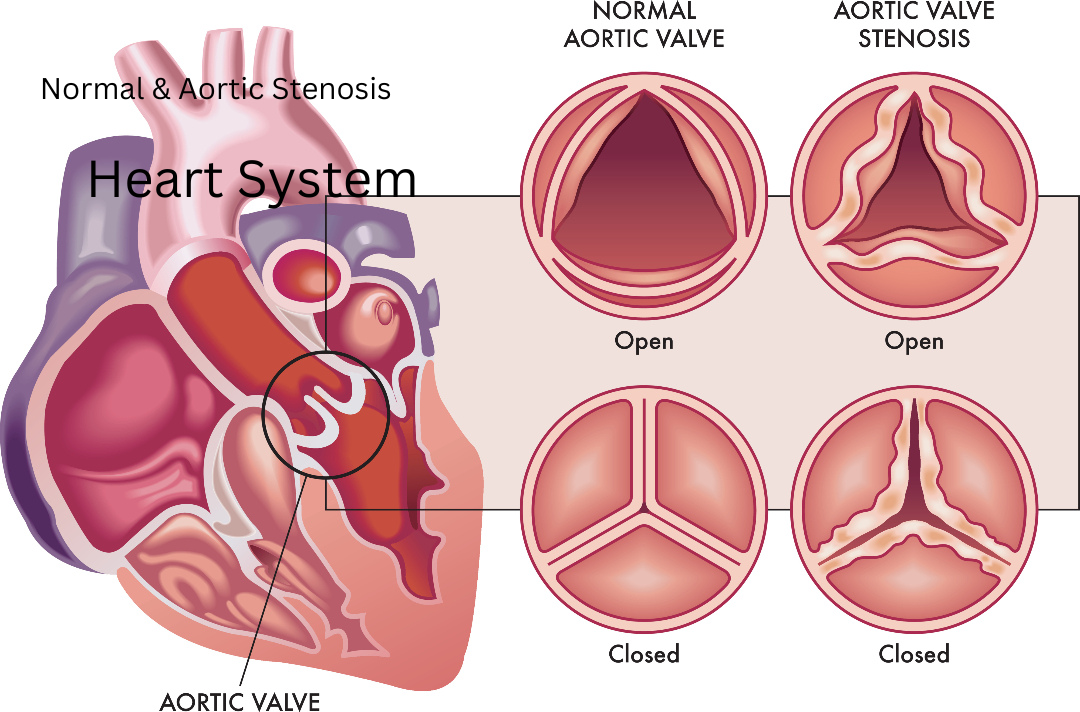Heart Failure, often called congestive heart failure, is like a traffic jam in the heart’s daily commute. In simple terms, it occurs when the heart is not pumping blood as efficiently as it should. Picture the heart as a powerful pump responsible for sending blood to all parts of the body. However, with heart failure, it’s like the pump is working a bit slower or less effectively.
In this condition, the heart might not be filling with enough blood or has trouble pushing it out. It’s a bit like a water pump struggling to send water through a clogged pipe. This inefficiency can lead to symptoms like fatigue, shortness of breath, and swelling. Imagine it as if the body is experiencing traffic jams due to the slow movement of blood.
Doctors may diagnose heart failure using tests like an echocardiogram to see how well the heart is pumping. Treatment for heart failure involves lifestyle changes and, in some cases, medications. It’s like giving the heart a helping hand to pump blood more efficiently and reduce the traffic jams.
Causes of Heart Failure
Heart Failure, much like understanding why a car might slow down, involves exploring the reasons that can make the heart’s pumping less efficient.
- Unhealthy Lifestyle Choices: When we eat too many sugary and fatty foods, it’s like adding extra weight to our heart. This can make it work harder, eventually leading to inefficiencies in pumping blood.
- Lack of Exercise: Picture our heart as a muscle that needs regular exercise. When we don’t move enough, it’s like the heart is taking a break, making it challenging for it to pump blood effectively.
- High Blood Pressure: High blood pressure is like a constant push on the heart. It can damage the heart over time, making it less efficient in its pumping role.
- Heart Valve Disorders: Sometimes, it’s like having a door that doesn’t close properly. Heart valve disorders can make it difficult for the heart to pump blood in the right direction, contributing to heart failure.
- Coronary Artery Disease: Imagine tiny roads leading to the heart. When these roads get blocked due to fatty deposits, it’s like traffic jams that can lead to inefficiencies in the heart’s pumping.
- Diabetes: Diabetes is like a traffic light malfunction. It can disrupt the signals the heart receives, affecting its ability to pump blood efficiently.
- Cardiomyopathy: Cardiomyopathy is like having a weak heart muscle. It can make it harder for the heart to pump blood, leading to inefficiencies in its performance.
- Infections: Infections affecting the heart can be like unexpected roadblocks. They can disrupt the heart’s normal functioning, contributing to heart failure.
Read.. What is Arrhythmias? Its Causes, Symptoms & Treatment
Symptoms of Heart Failure
The signals that our bodies give us is crucial, especially when it comes to Heart Failure. Let’s explore these signals, or symptoms.
- Fatigue: Feeling tired all the time is like a red flag from our body. It could mean that our heart is working extra hard and needs attention.
- Shortness of Breath: Imagine our lungs as balloons. When we have trouble breathing, it’s like the balloons can’t inflate properly, and our body is signaling that it needs more air.
- Swelling: Swelling, especially in the legs and ankles, is like our body’s way of saying, “Hey, I need help!” It happens when the heart is not pumping blood efficiently.
- Persistent Coughing: If we find ourselves coughing more than usual, it’s like our body’s way of clearing its throat. This can happen when the heart is struggling to pump blood effectively.
- Increased Heartbeat: Feeling our heart beating faster than usual is like a drum playing a different rhythm. It can be a signal that our heart is working harder than it should.
- Difficulty Sleeping: Trouble sleeping, especially lying flat, is like our body telling us that something is not quite right with our heart’s pumping.
- Loss of Appetite: If we’re not as hungry as usual, it’s like our body’s way of saying, “I’m not feeling well.” Heart Failure can affect our digestive system and appetite.
- Fainting or Dizziness: Feeling dizzy or fainting can be like our body signaling that it’s not getting enough blood. It’s a way of telling us to take it easy and seek help.
Read.. What is Mitral Valve Prolapse? Its Causes, Sypmtoms & Treatment
Treatment of Heart Failure
When it comes to taking care of our hearts, especially when they face challenges like Heart Failure, it involves a bit of teamwork between us and the doctors. Let’s explore the steps taken to help hearts heal.
Read.. What is Aortic Stenosis? Causes, Symptoms & Treatment
- Medications: Doctors often prescribe special medicines to help the heart work better. It’s like giving our hearts a bit of extra support to get back on track. These medicines can help the heart pump more efficiently and make sure the blood flows smoothly.
- Lifestyle Changes: Making changes in our daily routines is a crucial part of the treatment. It’s like creating a plan to keep our hearts healthy. Eating nutritious foods, staying active, and getting enough rest are important steps in helping our hearts recover.
- Monitoring Fluid Intake: Sometimes, doctors might ask us to pay attention to how much liquid we’re drinking. It’s like keeping track of the fuel we put in a car. Managing fluids helps the heart pump more effectively.
- Rest: Resting is a key part of the treatment. It’s like allowing our hearts to take a break and recover. Doctors might suggest a balance between activity and rest to ensure our hearts stay strong.
- Surgery or Medical Procedures: In some cases, doctors might recommend procedures to help the heart. It’s like a little maintenance work to ensure everything is running smoothly. These procedures can include repairing heart valves or implanting devices to assist the heart.
- Regular Check-ups: Once we’ve started treatment, regular check-ups are like health check-ins for our hearts. They ensure everything is on track and help catch any issues early on. It’s similar to how we visit the doctor for a regular check-up when we’re not feeling well.












I loved you even more than you’ll say here. The picture is nice and your writing is stylish, but you read it quickly. I think you should give it another chance soon. I’ll likely do that again and again if you keep this walk safe.
I loved you even more than you’ll say here. The picture is nice and your writing is stylish, but you read it quickly. I think you should give it another chance soon. I’ll likely do that again and again if you keep this walk safe.
What i do not understood is in truth how you are not actually a lot more smartlyliked than you may be now You are very intelligent You realize therefore significantly in the case of this topic produced me individually imagine it from numerous numerous angles Its like men and women dont seem to be fascinated until it is one thing to do with Woman gaga Your own stuffs nice All the time care for it up
I have been browsing online more than three hours today yet I never found any interesting article like yours It is pretty worth enough for me In my view if all website owners and bloggers made good content as you did the internet will be a lot more useful than ever before
you are truly a just right webmaster The site loading speed is incredible It kind of feels that youre doing any distinctive trick In addition The contents are masterwork you have done a great activity in this matter
Nice blog here Also your site loads up fast What host are you using Can I get your affiliate link to your host I wish my web site loaded up as quickly as yours lol
I was suggested this web site by my cousin Im not sure whether this post is written by him as no one else know such detailed about my trouble You are incredible Thanks
Thank you for the informative post. It was rather entertaining. It appears that you have progressed to a much more agreeable level. How can we stay in touch, though?
What i dont understood is in reality how youre now not really a lot more smartlyfavored than you might be now Youre very intelligent You understand therefore significantly in terms of this topic produced me personally believe it from a lot of numerous angles Its like women and men are not interested except it is one thing to accomplish with Woman gaga Your own stuffs outstanding Always care for it up
My brother recommended I might like this web site He was totally right This post actually made my day You cannt imagine just how much time I had spent for this information Thanks
My brother recommended I might like this web site He was totally right This post actually made my day You cannt imagine just how much time I had spent for this information Thanks
certainly like your website but you need to take a look at the spelling on quite a few of your posts Many of them are rife with spelling problems and I find it very troublesome to inform the reality nevertheless I will definitely come back again
Hi my family member I want to say that this post is awesome nice written and come with approximately all significant infos I would like to peer extra posts like this
Thank you I have just been searching for information approximately this topic for a while and yours is the best I have found out so far However what in regards to the bottom line Are you certain concerning the supply
Usually I do not read article on blogs however I would like to say that this writeup very compelled me to take a look at and do it Your writing style has been amazed me Thank you very nice article
Thanks for sharing. I read many of your blog posts, cool, your blog is very good.
Hi Neat post There is a problem along with your website in internet explorer would test this IE still is the market chief and a good section of other folks will pass over your magnificent writing due to this problem
Wow wonderful blog layout How long have you been blogging for you make blogging look easy The overall look of your site is great as well as the content
Normally I do not read article on blogs however I would like to say that this writeup very forced me to try and do so Your writing style has been amazed me Thanks quite great post
What i do not understood is in truth how you are not actually a lot more smartlyliked than you may be now You are very intelligent You realize therefore significantly in the case of this topic produced me individually imagine it from numerous numerous angles Its like men and women dont seem to be fascinated until it is one thing to do with Woman gaga Your own stuffs nice All the time care for it up
you are in reality a just right webmaster The site loading velocity is incredible It seems that you are doing any unique trick In addition The contents are masterwork you have performed a wonderful task on this topic
Fantastic site A lot of helpful info here Im sending it to some buddies ans additionally sharing in delicious And naturally thanks on your sweat
Fantastic site A lot of helpful info here Im sending it to some buddies ans additionally sharing in delicious And naturally thanks on your sweat
Nice blog here Also your site loads up fast What host are you using Can I get your affiliate link to your host I wish my web site loaded up as quickly as yours lol
Thanks I have recently been looking for info about this subject for a while and yours is the greatest I have discovered so far However what in regards to the bottom line Are you certain in regards to the supply
Your point of view caught my eye and was very interesting. Thanks. I have a question for you.
Thank you for the auspicious writeup It in fact was a amusement account it Look advanced to far added agreeable from you However how can we communicate
you are in reality a just right webmaster The site loading velocity is incredible It seems that you are doing any unique trick In addition The contents are masterwork you have performed a wonderful task on this topic
you are in reality a just right webmaster The site loading velocity is incredible It seems that you are doing any unique trick In addition The contents are masterwork you have performed a wonderful task on this topic
Wonderful web site Lots of useful info here Im sending it to a few friends ans additionally sharing in delicious And obviously thanks to your effort
Simply wish to say your article is as amazing The clearness in your post is just nice and i could assume youre an expert on this subject Well with your permission let me to grab your feed to keep updated with forthcoming post Thanks a million and please carry on the gratifying work
My brother recommended I might like this web site He was totally right This post actually made my day You cannt imagine just how much time I had spent for this information Thanks
Its like you read my mind You appear to know a lot about this like you wrote the book in it or something I think that you could do with some pics to drive the message home a little bit but instead of that this is fantastic blog An excellent read I will certainly be back
Hello i think that i saw you visited my weblog so i came to Return the favore Im trying to find things to improve my web siteI suppose its ok to use some of your ideas
I was suggested this web site by my cousin Im not sure whether this post is written by him as no one else know such detailed about my trouble You are incredible Thanks
certainly like your website but you need to take a look at the spelling on quite a few of your posts Many of them are rife with spelling problems and I find it very troublesome to inform the reality nevertheless I will definitely come back again
I loved as much as you will receive carried out right here The sketch is attractive your authored material stylish nonetheless you command get got an impatience over that you wish be delivering the following unwell unquestionably come more formerly again since exactly the same nearly a lot often inside case you shield this hike
I was suggested this web site by my cousin Im not sure whether this post is written by him as no one else know such detailed about my trouble You are incredible Thanks
I just could not leave your web site before suggesting that I really enjoyed the standard information a person supply to your visitors Is gonna be again steadily in order to check up on new posts
you are in reality a just right webmaster The site loading velocity is incredible It seems that you are doing any unique trick In addition The contents are masterwork you have performed a wonderful task on this topic
Meu primo me recomendou este site, não tenho certeza se este post foi escrito por ele, pois ninguém mais sabe tão detalhadamente sobre meu problema. Você é incrível, obrigado
My brother recommended I might like this web site He was totally right This post actually made my day You cannt imagine just how much time I had spent for this information Thanks
Olá, boa postagem, há um problema com seu site no Internet Explorer. Verifique se este IE ainda é o líder do mercado e uma grande parte de outras pessoas deixará de fora sua excelente escrita devido a esse problema
Your writing has a way of making even the most complex topics accessible and engaging. I’m constantly impressed by your ability to distill complicated concepts into easy-to-understand language.
Simply wish to say your article is as amazing The clearness in your post is just nice and i could assume youre an expert on this subject Well with your permission let me to grab your feed to keep updated with forthcoming post Thanks a million and please carry on the gratifying work
obviously like your website but you need to test the spelling on quite a few of your posts Several of them are rife with spelling problems and I to find it very troublesome to inform the reality on the other hand Ill certainly come back again
Eu simplesmente não poderia sair do seu site antes de sugerir que realmente gostei das informações padrão que uma pessoa fornece sobre seus visitantes. Voltarei incessantemente para verificar novas postagens
Wow amazing blog layout How long have you been blogging for you made blogging look easy The overall look of your web site is magnificent as well as the content
Its like you read my mind You appear to know so much about this like you wrote the book in it or something I think that you can do with a few pics to drive the message home a little bit but other than that this is fantastic blog A great read Ill certainly be back
Its like you read my mind You appear to know so much about this like you wrote the book in it or something I think that you can do with a few pics to drive the message home a little bit but other than that this is fantastic blog A great read Ill certainly be back
you are in reality a good webmaster The website loading velocity is amazing It sort of feels that youre doing any distinctive trick Also The contents are masterwork you have done a fantastic job in this topic
helloI like your writing very so much proportion we keep up a correspondence extra approximately your post on AOL I need an expert in this space to unravel my problem May be that is you Taking a look forward to see you
Somebody essentially help to make significantly articles Id state This is the first time I frequented your web page and up to now I surprised with the research you made to make this actual post incredible Fantastic job
Hi my family member I want to say that this post is awesome nice written and come with approximately all significant infos I would like to peer extra posts like this
I am not sure where youre getting your info but good topic I needs to spend some time learning much more or understanding more Thanks for magnificent info I was looking for this information for my mission
Thanks I have recently been looking for info about this subject for a while and yours is the greatest I have discovered so far However what in regards to the bottom line Are you certain in regards to the supply
I was recommended this website by my cousin I am not sure whether this post is written by him as nobody else know such detailed about my trouble You are amazing Thanks
Wow amazing blog layout How long have you been blogging for you made blogging look easy The overall look of your web site is magnificent as well as the content
This post has been incredibly helpful, like a guiding hand in a crowded room. The guidance is much appreciated.
Joy to read and contagious enthusiasm? I thought I was immune, but you proved me wrong.
The arguments were as compelling as The online persona. I’m totally sold—and not just on The ideas.
I appreciate the unique viewpoints you bring to The writing. Very insightful!